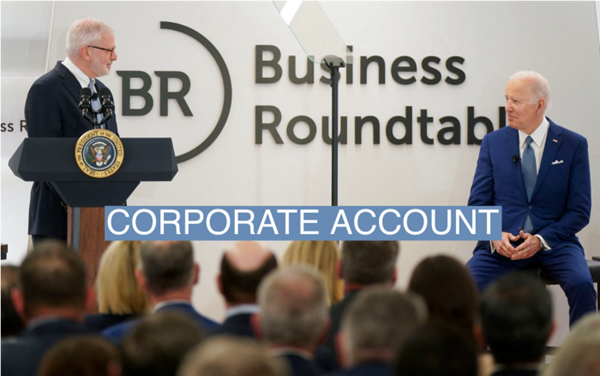
INTELLIGENT §
TRANSPARENT
§
GLOBAL
|
 Liz Hoffman
Liz Hoffman
Updated Sep 7, 2023, 1:42pm EDT
BUSINESS
CEOs promised a new era. Little
has changed.

Reuters/Pool/ABACA
|
 THE
SCENE THE
SCENE
Little has changed four years after the CEOs of America’s biggest
companies promised a more egalitarian approach to business, according
to a Semafor analysis of corporate filings.
The splashy 2019 commitment from the Business Roundtable and its 181
CEO signatories redefined the “purpose of a corporation” as more than
just a blind pursuit of profits.
Yet corporate spoils are still shared overwhelmingly with
shareholders, not employees. While executive compensation wasn’t
specifically called out in the pledge, CEO pay has continued to soar,
outpacing raises handed out to hourly workers, less out of generosity
than a post-pandemic scramble to hire workers.
In 2018, the year before the BRT made its commitments, the average CEO
made about 140
times what his or her average worker took home. Last year,
that ratio was 186 to 1.
Among the BRT’s 20 largest firms, CEO pay has risen from 324 times
that of the median worker in 2018 to 441 times in 2022.
Twelve of them spent more of their free cash flow last year buying
back stock than they did five years ago. Six, including Exxon, Procter
& Gamble, and Coca-Cola, spent less on physical investments and
technology in 2022 than in 2018, despite soaring profits. Six now have
lower ESG
scores from S&P Global than when they signed the BRT
statement.
The Business Roundtable meets next week in Washington with a more
earthly agenda as corporate bosses worry about rising
tensions with China, push for reforming the permitting
process for big infrastructure projects, and lobby for
retaining expiring tax benefits.
 LIZ’S
VIEW LIZ’S
VIEW
I think CEOs mostly meant it in 2019. Their failure to follow through
says a lot about the cold wind that’s swept in the past two years
through a business community that is desperate to drop the
do-gooderism, quit getting yelled at by Vivek Ramaswamy, and get back
to business.
Larry Fink has dialed back the ESG talk after becoming a target of
conservatives. Salesforce ditched its “wellness culture” for one of
“high performance,” and CEO Marc Benioff has stopped
touting his liberal politics. At Davos this year,
executives were largely absent from the conference’s virtue-signaling,
Ukraine-toasting, turnip-juice-guzzling
mainstage, packing their schedules instead with client
meetings in cloistered hotel suites.
Marc Pritchard, Procter & Gamble’s chief brand officer, said
last year that companies have “gone a bit too far into the
good” at the expense of growth, and entrants at this summer’s Cannes
Lions advertising awards were advised
by one juror to dial down the politics and focus on
“selling shit.”
A development that feels closely related: Nearly a third of those who
joined companies in diversity-related roles after the 2020 death of
George Floyd — which spurred a flood of statements and new goals from
big companies — have already left, according to Live Data
Technologies, which tracks employment trends.
The corporate softening of the 2010s, when CEOs set diversity goals
and shared dog photos on Instagram, feels like a relic. It was hustled
along by the #MeToo movement and hit a gauzy peak during 2020, with
the pandemic and widespread racial-justice protests. A wave of
anti-Asian violence and Russia’s invasion of Ukraine were also morally
unambiguous issues on which to take a stand.
But today’s questions are more deeply divisive — see: Bud Light
boycott— and CEOs are all too happy to stick their heads back below
the parapets.
 ROOM
FOR DISAGREEMENT ROOM
FOR DISAGREEMENT
The S&P 500 ESG index, which excludes about a third of the S&P 500
index for one unsavory practice or another, has beaten the market each
of the past four years, so there’s clearly value in standing
for something.
And over the past few months, companies have trimmed
buybacks in favor of physical investments, suggesting a
longer-term view of value.
 NOTABLE NOTABLE
-
“When did Walmart grow a conscience?” The
Economist on
corporate makeovers that would make “Milton Friedman turn in his
grave.”
-
The BRT’s 2019 manifesto that
started it all.
© 2023 SEMAFOR INC. |